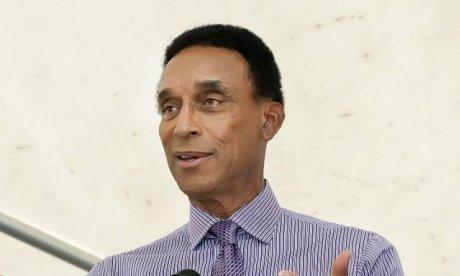Harlem Globetrotter, Business Executive, and ... Humanities Philanthropist

Mannie Jackson
Courtesy, Lewis and Clark Community College

Mannie Jackson
Courtesy, Lewis and Clark Community College
It’s unlikely Mannie Jackson dreamed, while attending racially-segregated schools in 1950s downstate Illinois, that one day he would be involved in an educational endowment designed to encourage humanities exploration and to help students and citizens of all backgrounds become culturally-aware community leaders. But his own story suggests that he was already thinking about how challenges in life can fuel one’s ambition and imagination. One of thirteen children born in a converted railroad boxcar in tiny Ilmo, Illinois, and raised in a segregated part of Edwardsville, Jackson experienced firsthand the pressures of poverty and prejudice, attending segregated schools until the eighth grade. (Edwardsville’s schools were finally integrated in 1952, two years before the US Supreme Court’s Brown v. Board of Education ruling.) It wasn’t until he started attending Edwardsville High School that Jackson discovered his gift for playing basketball and was subsequently named a first-team all-state basketball player and Illinois Prep Player of the year. Later the University of Illinois recruited him and he became the team’s captain and eventually earned All-America honors. In the 1960s, Jackson played with the Harlem Globetrotters, but then left the court for the corporate board room, working for Honeywell and General Motors and serving on five Fortune 500 Boards of Directors before buying the Harlem Globetrotters in 1992 and rescuing the club from financial ruin.
In 2012, Lewis and Clark Community College announced a pledge of $200,000 from Jackson to establish the Mannie Jackson Endowment and Center for the Humanities. According to Jill Lane, LCCC’s Dean of Liberal Arts and Business, Jackson’s “hope for his namesake endowment and Center for the Humanities is that people will remember the challenges of the past and learn how transformational leaders take those challenges and turn them into aspirations and goal achievement. He envisions an international center that ignites students’ imaginations, nurtures community service and sustains the humanities, and is looking forward to increasing cultural opportunities in the region.” The $200,000 pledge is part of a match to an NEH offer of $250,000 to endow a humanities institute at LCCC. For $400,000, Jackson has also purchased and partially renovated the Lincoln School in Edwardsville—which was the only school in town open to African Americans until 1951—which will be the future home for the Mannie Jackson Center for the Humanities.